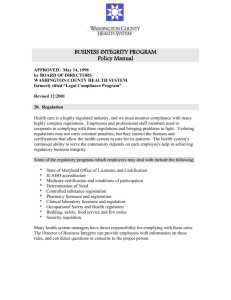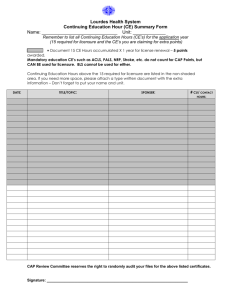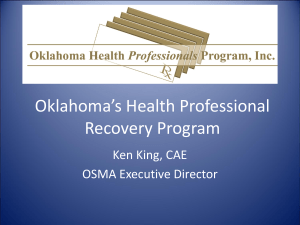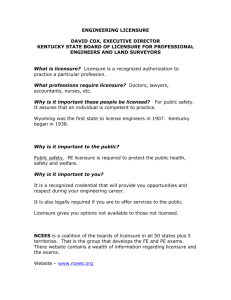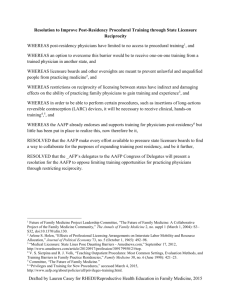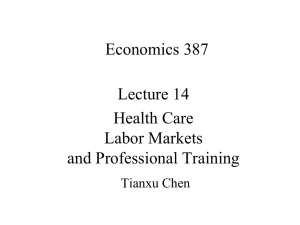Medical Licensure and Other Emergency Legal
advertisement
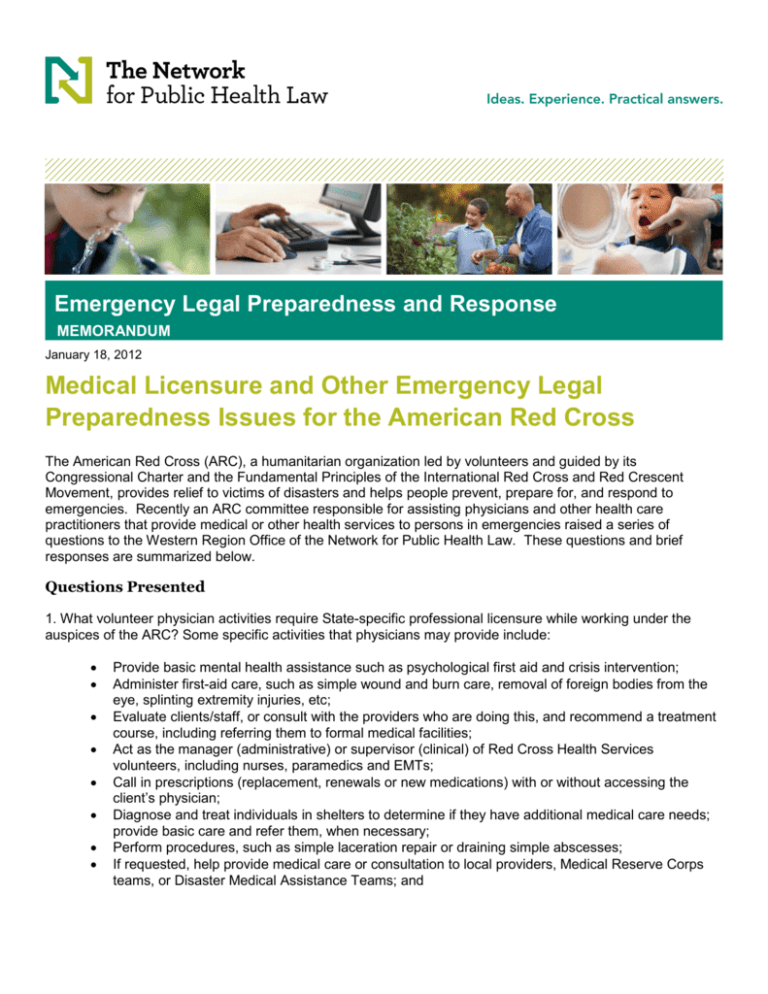
Emergency Legal Preparedness and Response MEMORANDUM January 18, 2012 Medical Licensure and Other Emergency Legal Preparedness Issues for the American Red Cross The American Red Cross (ARC), a humanitarian organization led by volunteers and guided by its Congressional Charter and the Fundamental Principles of the International Red Cross and Red Crescent Movement, provides relief to victims of disasters and helps people prevent, prepare for, and respond to emergencies. Recently an ARC committee responsible for assisting physicians and other health care practitioners that provide medical or other health services to persons in emergencies raised a series of questions to the Western Region Office of the Network for Public Health Law. These questions and brief responses are summarized below. Questions Presented 1. What volunteer physician activities require State-specific professional licensure while working under the auspices of the ARC? Some specific activities that physicians may provide include: • • • • • • • • Provide basic mental health assistance such as psychological first aid and crisis intervention; Administer first-aid care, such as simple wound and burn care, removal of foreign bodies from the eye, splinting extremity injuries, etc; Evaluate clients/staff, or consult with the providers who are doing this, and recommend a treatment course, including referring them to formal medical facilities; Act as the manager (administrative) or supervisor (clinical) of Red Cross Health Services volunteers, including nurses, paramedics and EMTs; Call in prescriptions (replacement, renewals or new medications) with or without accessing the client’s physician; Diagnose and treat individuals in shelters to determine if they have additional medical care needs; provide basic care and refer them, when necessary; Perform procedures, such as simple laceration repair or draining simple abscesses; If requested, help provide medical care or consultation to local providers, Medical Reserve Corps teams, or Disaster Medical Assistance Teams; and • Staff medical facilities run by the Red Cross. (This is generally only done through the International Red Cross in non-U.S. venues.) 2. What professional licensure problems for individual physicians occur if the ARC deployed volunteer physicians to a state where they were not licensed during a nationally-declared disaster? Are there ways to avoid these problems? 3. What professional licensure problems would be faced for individual physicians if the ARC deployed volunteer physicians to a state where they were not licensed during a declared state/regional disaster? Are there ways to avoid these problems? 4. What professional licensure problems for individual physicians would be faced if the ARC deployed volunteer physicians to a state where they were not licensed during a disaster for which there is no official declaration (e.g., a multi-family fire or local flooding)? Are there ways to avoid these problems? Brief Answers and Analysis Question 1: What ARC volunteer physician activities require State-specific professional licensure? Generally, a licensed physician may only practice medicine in his/her state of licensure. What constitutes the practice of medicine is defined under state law (e.g., statutes, regulations, judicial opinions, Medical Board policies), and may vary from state to state. Most states use a broad definition of “practicing medicine,” which typically includes providing treatment, prescribing drugs, making diagnoses, and similar activities. 1 For example, Washington State defines the practice of medicine to include (1) offering or acting to “diagnose, cure, advise, or prescribe” for any physical or mental disease or condition; (2) administering or prescribing drugs or medications; and (3) severing or penetrating human tissue. 2 Consulting from an out-of-state location is considered practicing medicine in some states, but not in others. 3 Many states also explicitly exclude uncompensated emergency response activities from their definition of “practicing medicine,” even if the specific activities involved would otherwise qualify. 4 This policy option supports physicians who provide emergency services as “Good Samaritans,” most typically in response to accidents or other, limited emergency events. If a physician’s acts constitute the practice of medicine, he or she must be licensed in the state where the acts are undertaken. If the act does not fit within the definition of practicing medicine (and could thus be done by non-physicians), a physician would not need to be licensed as a medical practitioner in state, but may require some other type of professional licensure depending on the act undertaken. Additionally, many state laws 5 and interstate agreements 6 (discussed below) recognize out-of-state licensure for purposes of emergency response. If afforded temporary license reciprocity, volunteer physicians typically have the same scope of practice (with respect to the response) as physicians licensed in the state in which the emergency occurs. A physician’s scope of practice remains limited, however, by the proper scope of the physician’s license in his/her home state. 7 For example, a physician licensed in State A and assisting in emergency response in State B could respond to the emergency in the same way as a State B physician so long as it did not go beyond what the physician could properly do under his/her State A license. Question 2: What licensure problems apply to physicians in another state during a nationally-declared disaster, and how can they be avoided? National declarations of emergency or public emergency, such as under the Stafford Act, 8 National Page 2 Emergencies Act, 9 or Public Health Services Act, 10 allow for mobilization and deployment of various resources and waiver of certain federal provisions. Because physician licensure is a matter of state law, national declarations have little effect on the authority of volunteer physicians to practice in a state where they are not licensed (other than federal volunteers who may acquire the imprimatur of federal agent status during a declared emergency, thus allowing them to practice in any federal facility in any state). However, as noted below, some state-based provisions or interstate agreements may authorize temporary volunteer emergency responses activities though licensure reciprocity or other mechanisms during declared emergencies or even absent a declared emergency. Question 3: What licensure problems apply to physicians assisting in another state during a declared state or regional disaster, and how can they be avoided? State declarations of “emergency,” “disaster,” or “public health emergency” may trigger specific exceptions to physician licensure requirements. Many states authorize waivers of licensure requirements during a declared emergency in order to allow out-of-state volunteer health professionals (VHPs), including physicians, to assist in emergency response. 11 Model emergency statutes such as the Model State Emergency Health Powers Act (MSEHPA) and the Uniform Emergency Volunteer Health Practitioners Act (UEVHPA) have been widely utilized by states to fashion their emergency response laws. 12 State laws based on these models authorize license reciprocity for VHPs during a declared emergency. This means that licensed VHPs in good standing in other states can practice medicine related to emergency response efforts in the same capacity as if they were licensed in the state in which the emergency is declared. Additionally, interstate mutual aid agreements and memoranda of understanding (MOUs) may authorize exceptions to state licensing requirements to facilitate sharing of VHPs. For example, the Emergency Management Assistance Compact (EMAC) 13 authorizes a state to recognize out-of-state licenses for medical professionals serving as state agents and rendering aid during a declared emergency or disaster. 14 VHPs licensed in other states and deployed through EMAC are regarded as licensed in the requesting state for the duration of the response. 15 Question 4: What licensure problems exist for out-of-state volunteer physicians assisting in response to an emergency without an official declaration of emergency, disaster, or public health emergency, and how can they be avoided? Absent an official state declaration of emergency, disaster, or public health emergency, many licensure reciprocity provisions may not apply. For example, EMAC requires a declaration of an emergency by a state and a request for assistance to allow the deployment of out-of-state volunteers. 16 MSEHPA and UEVHPA also require declared states of disaster or emergency. 17 In states that do not provide for licensure reciprocity outside a declared emergency, volunteer physicians who are not licensed in the state may not lawfully perform any activities that constitute the practice of medicine under state law. Some states, however, have broader reciprocity provisions that are not tied to emergency declarations. For example, Minnesota, Connecticut, West Virginia, and Illinois allow physicians licensed in other states to provide care within the state in response to an emergency, whether accompanied by an official declaration or not. 18 California similarly provides for health professional reciprocity for those providing emergency assistance at the request of the Director of Emergency Medical Services Authority. 19 Page 3 SUPPORTERS This document was developed by Daniel G. Orenstein, J.D., Deputy Director, Network for Public Health Law – Western Region at the Sandra Day O’Connor College of Law, Arizona State University, with assistance from Lexi White, J.D./PhD candidate and legal researcher, Sandra Day O’Connor College of Law, Arizona State University, based on existing work 20 and review by James G. Hodge, Jr., J.D., L.L.M., Director, Network for Public Health Law – Western Region. The Network for Public Health Law is a national initiative of the Robert Wood Johnson Foundation with direction and technical assistance by the Public Health Law Center at William Mitchell College of Law. The Network provides information and technical assistance on issues related to public health. The legal information and assistance provided in this document does not constitute legal advice or legal representation. For legal advice, please consult specific legal counsel. References 1 American Bar Association, What is “the unauthorized practice of medicine”?, ABA Family Legal Guide (2004), http://public.findlaw.com/abaflg/flg-17-3a-17.html. 2 W ASH. REV. CODE §18.71.011. 3 American Medical Association, Physician Licensure: An Update of Trends, http://www.ama-assn.org/ama/pub/about-ama/ourpeople/member-groups-sections/young-physicians-section/advocacy-resources/physician-licensure-an-update-trends.page (accessed Jan. 12, 2012). 4 E.g., OKLA. STAT. tit. 59 § 492(D)(2). 5 For example, in a state that has adopted the provisions of the Uniform Emergency Volunteer Health Professionals Act (UEVHPA), discussed below. 6 Such as the Emergency Management Assistance Compact (EMAC), adopted by all fifty U.S. states, Puerto Rico, the US. Virgin Islands, and the District of Columbia (discussed below). 7 See, e.g., American Medical Association, Legal Resources: AMA Adopts Policy Supporting the Uniform Emergency Volunteer Health Practitioners Act, http://www.ama-assn.org/ama/pub/physician-resources/public-health/general-resources-health-careprofessionals/legal-resources.page (accessed Jan. 13, 2012). 8 42 U.S.C. §§ 5121-205. For more information, see http://fpc.state.gov/documents/organization/53688.pdf. 9 50 U.S.C. §§ 1601-51. For more information, see http://www.fas.org/sgp/crs/natsec/98-505.pdf. 10 42 U.S.C. § 201. For more information, see http://www.phe.gov/preparedness/planning/authority/pages/default.aspx. 11 For example, North Carolina’s Board of Medicine may waive licensure requirements during a declared emergency. N.C.GEN.STAT.ANN. § 90-12.2 (2005). 12 MSEHPA has been enacted in whole or in part by 33 states and the District of Columbia. www.publichealthlaw.net/Resources/Modellaws.htm. The UEVHPA has been adopted by 12 states and the District of Columbia. http://www.facs.org/ahp/uevhpa.html. 13 http://www.emacweb.org/. 14 EMAC Article V, http://www.emacweb.org/index.php?option=com_content&view=article&id=155&Itemid=271. 15 EMAC Article V, http://www.emacweb.org/index.php?option=com_content&view=article&id=155&Itemid=271. 16 EMAC Article IV, http://www.emacweb.org/index.php?option=com_content&view=article&id=155&Itemid=271. 17 Centers for Law & the Public’s Health: A Collaborative at Johns Hopkins and Georgetown Universities, Uniform Emergency Volunteer Health Practitioners Act (UEVHPA): An Overview, http://www.publichealthlaw.net/Research/PDF/ESAR%20VHP%20UEVHPA.pdf (accessed Jan. 13, 2012). 18 MINN. STAT. § 12.42 (1996); CONN. GEN. STAT. § 20-9(b)(3) (2003); W. VA. CODE § 30-3-13(b)(5) (West 2004); 20 ILL. COMP. STAT. 3305/16 (2005). 19 CAL. BUS. & PROF. CODE § 900 (West 2005). 20 Hodge, JG, Anderson, E, Gable, LA, Vernick, JV, Teret, SP. Emergency System for Advance Registration of Volunteer Health Professionals (ESAR-VHP): Legal and Regulatory Issues, Department of Health and Human Services (DHHS). Washington, DC: 2008; 1-187, http://www.publichealthlaw.net/Projects/ESAR-VHP.php Page 4
